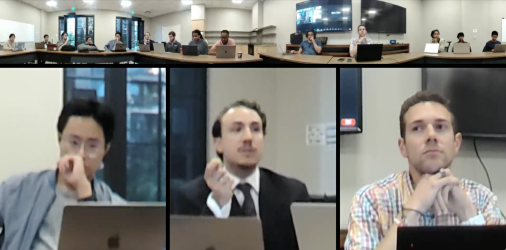The Graduate Student Council (GSC) passed a controversial fossil fuel resolution with 12 votes in favor, one abstention and one opposed at its meeting last week. The resolution, which was also passed by the Undergraduate Senate, condemns industry-funded partnerships between Stanford affiliates and four leading fossil fuel companies: ExxonMobil, Shell USA, Chevron and BP America. The developments come in light of recent efforts by “Big Oil” to partner with elite institutions, as revealed in the recent U.S. Senate bicameral staff report.
Several students asserted their moral responsibility to pressure the University to sever industry relationships. Perry Nielsen, who chairs the Vaden Student Health Advisory Committee, emphasized that timeliness is a crucial factor in the GSC’s response.
“Given the abundance of evidence in the U.S. Staff report, and just the fact that the highest court of law, the U.S. Congress, has found these companies to be doing this type of manipulation explicitly, I find that this is something that we should, and are obligated, to take action on quickly rather than slowly,” Nielsen said.
Nielsen said that Big Oil partnerships can condition industry funding on receiving a favorable public image from the academic institution.
“Our response needs to be very aggressive to demonstrate how serious Stanford University is about severing these ties until these companies can demonstrate a better working relationship and really have a commitment to true sustainability, to true human progress, instead of just trying to benefit their bottom line,” Nielsen said.
Members debated amendments concerning the bill’s implementation timeline and whether the four fossil fuel companies should maintain their presence at campus career fairs.
The GSC voted against extending the moratorium on funding for the industrial affiliate programs of the four fossil fuel companies to three months. Instead, funding will not resume until Stanford’s oversight body decides to re-engage with these companies.
Councilors questioned the merits of fossil fuel corporate representation at campus recruiting events, with some claiming that their presence inspires students to create change within companies, while others argued that allowing company access to career fairs is not the best way for students to create change.
Residential and Dining Enterprises (R&DE) shared updates on the graduate student housing lottery, food pantry, cooking classes and the EVGR Pub & Beer Garden liquor licensing.
After 200 graduate students were left unassigned after the first round of housing selection, Justin Akers, the Senior Director for student housing assignments, said those students may enter the reassignment round in July. Akers stated that students who have received an assignment can re-rank their preferences, and will be automatically reassigned to a higher preference if there is a vacancy.
Emmit Pert, fourth-year Ph.D. student in chemistry and GSC co-chair, said that if housing assignments are unsuccessful, students can channel their complaints through the GSC to increase their chances for redress.
Eric Montell, assistant vice provost of Stanford Dining, Hospitality and Auxiliaries (SDHA), shared updates on the EVGR Pub, which has been limited to serving beer and wine in the upstairs pavilion because Stanford’s third-party alcohol provider was acquired by another company subject to different legal standards. Though the timeline for receiving regulatory approval is uncertain, Montell said that R&DE is taking the “next steps” to allow the Pub to return to full service.
Montell also shared R&DE aims to create an inclusive graduate student program with cooking classes, which have been immensely popular among both undergraduates and graduates.
Looking ahead to the summer quarter, the GSC also discussed the future of the R&DE food pantry, which occurs each month during the academic year in collaboration with Second Harvest of Silicon Valley, one of the largest food banks in the country.
Recognizing that the success of the program depends on the efforts of student volunteers and collaboration with the GSC, Montell advised against student “no-shows” to ensure that they “are not providing food to the campus in a way that is taking away from other needy stakeholders or communities.”
A previous version of this article misattributed comments on a fossil fuel divestment resolution. The Daily regrets this error.
